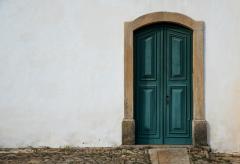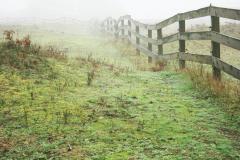La Frontera: Notes From a Convention Workshop
By Delfin Bautista, DignityUSA
Editor’s Note: Delfin led a workshop entitled Deconstructing and Reconstructing Gender: Creating a Catholic Transgender Narrative. Below are the notes from which Delfin spoke, reprinted here as poetry.
“For the lesbian of color, the ultimate rebellion she can make against her native culture is through her sexual behavior...she goes against two moral prohibi- tions: sexuality and homosexuality. Being lesbian and raised Catholic, indoctrinated as straight, I made the choice to be queer. It’s an interesting path, one that continually slips in and out of the white, the Catholic, the Mexican, the indigenous, the instincts. in and out of my head. It makes for loqueria, the cra- zies. It is a path of knowledge--one of knowing and of learning the history of oppression of our raza. It is a way of balancing, of mitigating duality.”
-Gloria Anzaldua, Borderlands, La Frontera: The New Mestiza
“There is no longer Jew or Greek, there is no longer slave or free, there is no longer male and female; for all of you are one in Christ Jesus. And if you belong to Christ, then you are Abraham’s offspring, heirs according to the promise.”
-Paul’s letter to the Galations 3:28-29
Balancing and mitigating duality ...
Neither Greek or Jew, neither male or female ...
many have argued that these words of Paul
Reflect the making of an emerging Christian tribe ...
who like us, was coming together in hopes of sorting out their identity
As individuals and as a community in the midst of changes in government,
Religious and cultural persecution of their beliefs that differed from the norm,
And infighting among their leaders over who could and couldn't be a Christian.
However, rather than engaging this surface under- standing,
I want us to go deeper and query Paul’s idea and use of “or”
In light of Gloria’s concept of duality,
venturing that Paul was a theologian of la frontera.
His message to the Galatians is that
there is neither blank or blank,
because they are a both/and people—
a people who dwell in the borderlands identities and justice.
Like the Galatians, we too dwell in the borderland... we are individuals who embody both
Greek and Jew, male and female, black and white ... It’s a messy inner coexistence
but the early Christian communities were onto some- thing profoundly radical...
The refusal to limit people to one label and
with that limitation impose a number of expectations that
stump wholeness and human dignity.
In my journey of trying to make sense of GOD’s calling...
I have often found inspiration in biblical figures who embodied intersecting identities...
Individuals like Mary of Nazareth who was woman, prophet, apostle, and mother...
Paul, himself, who was
Greek, Jew, Roman, soldier, follower of Christ, persecutor, persecuted...
Though not a biblical character, Gloria embodied la frontera,
or as she and others have called it the mestizaje of identities...
she was poet, activist, Chicana, Catholic, and a lesbian.
Like them, I too am a mosaic of identities...a person of the borderlands.
I am not one identity, though a label is often imposed on me
by society, the church, and the media.
I am limited to just being queer or a person of faith or Latino or a social worker,
Rather then having my whole self embraced, af- firmed, and celebrated.
Despite labels and categories that seek to limit and dehumanize me,
I refuse to be boxed and type-casted into conformity and
the silence of a supposed inclusivity. Our prophetic calling,
the radicalness of Paul’s message and of Gloria's du- ality,
is to have all our identities interact, fight, and coexist...
to live into and be a frontera, a borderland.
I believe that Paul and the early Christian communi- ties
were not advocating for differences and particularities to be quelled or
melted into an amorphous blob of gook.
Rather, it is invitation to unity, both internal and tribal,
based on the celebration of differences,
A lifting up of the borders within and among us.
It is a call for us here now to bring to the Eucharistic table,
the classroom, our social and cultural circles, to civil society
all of who we are as individuals, as tribes, as communities--
recognizing our multifaceted nature, our complexities, and our richness.
It is an invitation to challenge ourselves to perhaps rethink how we gather in groups...
Living through the tensions of creating and respecting the need for safe spaces
for young adults, women, people of color, and trans-identified individuals
while also being mindful that while Delfin may claim our trans identity,
We too are also a young adult and latino...
can there be spaces that affirm all of me and all of us?
The border is more than just the division between the US and Mexico,
Haiti and the Dominican Republic,
Android and Apple,
Conservative Catholic and Progressive Catholic ...
Racial and gender categories...
It is more than the lines separating our religious traditions.
Boundaries are places of encounter.
We are conditioned, however, to be fearful of difference,
To water down our identities and all that makes us unique.
We are brainwashed into wanting the same car,
hairstyle, white picket fence, apps for our smart phones,
and unhealthy notions of body ...
our quirks are blow dried, straightened, dyed, lyposuctioned and botoxed...
We are coerced by the media, the education system, and by the Church
To erase borders and to blur la frontera --
to uphold false notions of inclusivity that in reality painfully exclude,
marginalize, and oppress those who
believe that “Kum ba yah” is more than just a melt- ing pot
but a yearning for conflict and tension in harmony.
We are not the same, that’s okay ... I thank GOD we are not the same.
borders and boundaries are not places of problematic divisiveness,
But sanctuaries of encounter, to cross over and be with the other,
to have the other cross over and be with us.
As a familia or as a community seeking to create the Kingdom of God,
Through our differences, we are united by our common passion for equality
and together flow down the river of justice.
As poet and prophet Dr. Maya Angelou puts it,
We are each a rainbow in each other’s clouds.
As we dwell in the borderlands within us and among us,
We must remember that we are not alone but that we journey together—
Where you go, I go....where I go, you go...
We dwell in the borderland in the company of witnesses who have gone before us
and witnesses with us now...
challenging and being challenged to be embrace our wholeness.
if we look to Scripture,
We discover a GOD who is at times contradictory and even snarky.
But it is this GOD...the GOD of Abraham, Isaac, and Jacob...
The GOD praised in the Psalms...
the GOD who smited and who also heard the cries of Her people...
the GOD whom Jesus called Abba...
It is this GOD who lovingly created us, graced us, blessed us as good...
Not just select pieces of us, but the whole person
with all our
quirks, contradictions, bloopers, passions, and gifts.
We are created in the image of a GOD who like us is
An embodied mosaic of interlocking, interacting, interfering identities.
Going beyond the “or” of Paul and becoming the "both/and" of Gloria is not easy,
Especially when our frontera is filled with clashing identities.
However, it can be a fun enlightening mess of con- fusion and whole-izing holiness.
When we dwell in the borderland,
We are invited to experiment, get messy, take risks, pursue chances.
As Chicana Poet and Lesbian Activist describes it,
to live in the borderlands means
to put chile in the borscht,
eat whole wheat tortillas,
speak tex-mex with a brooklyn accent;
to survive and thrive in the borderlands
you must live sin fronteras,
be a crossroads.
We are called to embrace our fronteras
Not with fear and dominance, But with humility and gusto.
Jesus was an immigrant and exilee and prophet of inclusivity...
born into poverty, He was a son, teacher, carpenter, Jew,
student, rabbi, friend, lover, savior, healer, radical...
A person trying to survive political, religious, and cultural upheavals...
It was the interacting and interfering of all of this that
helped Jesus understand His calling—
He did not deny who he was or where he was from,
Rather he allowed all of it to come together...
the miracles, the sermons, the crowds on the mount, the parables,
the times in the desert, the work in the carpentry shop,
the repetitions of stories to disciples who just didn't seem to get it,
The coming together of divine and human at the transfiguration,
The cross and the resurrection....
All of it together, messy, challenging, freeing, a borderland...
throughout His ministry Jesus patiently, lovingly,
helped the ragtag group of misfits who followed him dwell in la frontera..
Jesus showed them how to come into their own by embracing their own borderlands of
fishermen, shepherds, zealots, tax collectors, people on the fringe...
Like Jesus, like Paul, like all those we turn to for inspiration,
we are called to celebrate the fronteras within us and among us.
To dwell in the borderlands is to flow and ripple like a river of justice...
It is how this trans-identified, Hispanic, flat footed, chunky and funky,
social worker who savors transgressive theologies
Is able to embrace the call and invitation of intersectional justice...
As we dwell and journey in the borderlands within us and among us,
We are all called to live the prophetic life of the frontera...
to give birth to the Divine in our words, deeds, hearts, thoughts, and lives ...
an invitation to be our whole selves and to help oth- ers live authentically whole.
As we embrace our many identities,
Like Jesus, like Paul, like the Galatians, like Gloria, like the GOD who created us,
we are no longer made to feel ashamed for existing...
we will rant our voices, dance our dances, pray our prayers,
it will be loud and messy,
but it will proclaim the wonders and dynamism of GOD and of all of creation.
As we dwell in the frontera,
Will we let it be done to us according to the radical and inclusive word of GOD?
How have we responded?
How are we responding?
How will we respond?
To GOD’s call and invitation to
embody the sacredness of the borders within us and among us?
May it be done to us according to GOD’s living, organic,
evolving, revolutionary, transfiguring, harmoniously tense, both/and-ed Word.
bendiciones en su lucha y en su caminar...Blessed be...Amen.





